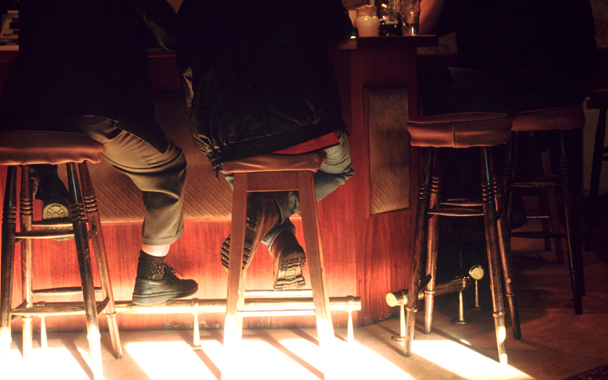Would you mind moving down over there?” The bartender pointed towards a chair next to a man who, a minute ago, had clearly been asleep. She explained, “The man who’s going to sit in the chair next to you is HUGE. He used to be a basketball player or something.”
I smiled and complied, the luxury of space not being one of Sake Bar Hagi’s charms. Anyway, the seat I moved to gave me a better view of the convivial eating and drinking: dozens of people—many Japanese, many not—mashed up against one another drinking and munching on chicken skewers, noodles, grilled fish collars.
I love this place both for its night-out bustle and for its satisfying, homey food, by which I mean that some of it resembles after-school snacks as much as anything else. The server brought one of those snacks, a plate of spaghetti with bacon, onions, and ketchup (everyone laughs at it; no one doesn’t finish it). I piled on the traditional accompaniments—Kraft Parmesan and Tabasco—and dug in, eager to finish up and get home to catch a phone call.
The guy next to me woke up and started reading his newspaper, signaling for the bartender to pour him another round of sake. “Is it buy four, get the fifth free?” he asked.
He looked over from his drink and asked about my food. I offered some, as much to prevent us from talking as to share, since I was in a hurry. But as he sampled from the small plate I gave him, he introduced himself as William and asked about the writing on my tattoo. He told me that he was a student of Japanese, and then went into the history and origin of Chinese characters—a fascinating topic, but one that I was subtly trying to forego to concentrate on my bacon and ketchup. I managed for a while, until he noticed the book I was reading, Raymond Carver’s What We Talk About When We Talk About Love.
“That reminds me of an essay one of the waiters here was writing for his English class,” he said. I looked at the staff, young Japanese hipsters. A dude in the kitchen had one sleeve of his t-shirt rolled up to his muscular shoulder, his black hair falling swashbucklingly out of his bandanna. Another, serving drinks, rocked the always ill-advised chinstrap beard, but with enough attitude to pull it off. I chuckled a little at the thought of one of these dudes learning to write in English by writing about love.
“He wrote that food is love,” William told me. “That he was going to end up marrying a girl from his hometown, because no one else would be able to cook like his mother.”
“Aw, that’s sweet,” I said. “And also creepy.”
“Very creepy,” William laughed.
I didn’t feel in a hurry to leave anymore.
He told me about his wife, a Japanese woman, and about how, when they were dating, he learned the recipe for her family’s miso soup, making it for her breakfast every morning. She, in turn, made him omelets the way he liked them. “She probably wouldn’t have married me otherwise,” he said, smiling. “But—this is terrible—I haven’t made it for her since we got married.”
Then he started telling me about a tradition of Japanese brides-to-be apprenticing with their fiancés’ mothers to learn the family recipes. We talked more about families, and the importance of eating the foods we grew up with. “Did your wife apprentice with your mother?” I asked.
“My mother was not a very good cook,” he sighed. But now that he thought about it, he recalled that right after his parents were married, his mother woke up one morning and made eggs the way his father had always loved them. He was flabbergasted; she’d secretly asked her new mother-in-law how to do it.
I remembered my phone call and got up to leave, shaking William’s hand. As I put on my jacket, I said, “Make some soup for her tomorrow morning.” He smiled, nodded, and waved.




 Pinterest
Pinterest


